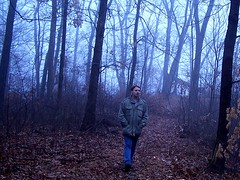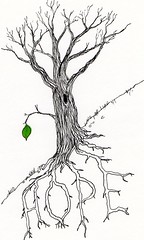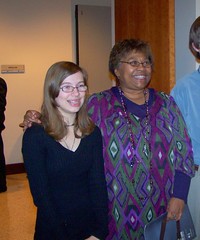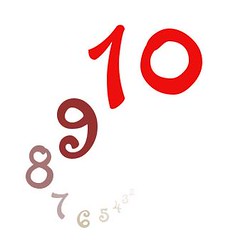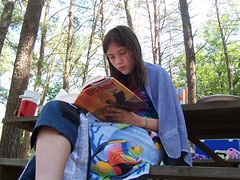Part of a continuing series where I post biblical passages that deal with wealth, poverty, money, greed, simplicity, the rich and the poor. When I'm done, I'd like to have a fairly comprehensive collection of such passages all in one location. You can see other entries in this series in my sidebar on the left, under The Bible and Economics heading.
I've already looked at Jesus' teachings in the Sermon on the Mount (Matt 5-7). Today, I'm looking at verses scattered throughout the middle of the book of Matthew, from chapter 10 to chapter 19. Next month, I'll look through the rest of Matthew...
[Jesus speaking, sending out the disciples to preach...]
And as you go, preach, saying, 'The kingdom of heaven is at hand.'
Heal the sick, raise the dead, cleanse the lepers, cast out demons. Freely you received, freely give.
Do not acquire gold, or silver, or copper for your money belts, or a bag for your journey, or even two coats, or sandals, or a staff; for the worker is worthy of his support.
~Matthew 10:7-10
Now when John, while imprisoned, heard of the works of Christ, he sent word by his disciples and said to Him, "Are You the Expected One, or shall we look for someone else?"
Jesus answered and said to them, "Go and report to John what you hear and see: the BLIND RECEIVE SIGHT and the lame walk, the lepers are cleansed and the deaf hear, the dead are raised up, and the POOR HAVE THE GOSPEL PREACHED TO THEM.
"And blessed is he who does not take offense at Me."
As these men were going away, Jesus began to speak to the crowds about John, "What did you go out into the wilderness to see? A reed shaken by the wind?
"But what did you go out to see? A man dressed in soft clothing? Those who wear soft clothing are in kings' palaces!..."
"But what did you go out to see? A prophet? Yes, I tell you, and one who is more than a prophet."
For John came neither eating nor drinking, and they say, 'He has a demon!'
"The Son of Man came eating and drinking, and they say, 'Behold, a gluttonous man and a drunkard, a friend of tax collectors and sinners!' Yet wisdom is vindicated by her deeds..."
"Come to Me, all who are weary and heavy-laden, and I will give you rest.
"Take My yoke upon you and learn from Me, for I am gentle and humble in heart, and YOU WILL FIND REST FOR YOUR SOULS.
"For My yoke is easy and My burden is light."
~Matthew 11:2-9; 18-19; 28-30
Then Jesus told his disciples, “If anyone would come after me, let him deny himself and take up his cross and follow me. For whoever would save his life will lose it, but whoever loses his life for my sake will find it.
For what will it profit a man if he gains the whole world and forfeits his soul? Or what shall a man give in return for his soul?
~Matthew 16:24-26
When they came to Capernaum, those who collected the two-drachma tax came to Peter and said, "Does your teacher not pay the two-drachma tax?"
He said, "Yes." And when he came into the house, Jesus spoke to him first, saying, "What do you think, Simon? From whom do the kings of the earth collect customs or poll-tax, from their sons or from strangers?"
When Peter said, "From strangers," Jesus said to him, "Then the sons are exempt.
"However, so that we do not offend them, go to the sea and throw in a hook, and take the first fish that comes up; and when you open its mouth, you will find a shekel. Take that and give it to them for you and Me."
~Matthew 17:24-27
Then some children were brought to Him so that He might lay His hands on them and pray; and the disciples rebuked them.
But Jesus said, "Let the children alone, and do not hinder them from coming to Me; for the kingdom of heaven belongs to such as these..."
["The Rich Young Ruler"]
And someone came to Him and said, "Teacher, what good thing shall I do that I may obtain eternal life?..."
...Jesus said to him, "If you wish to be complete, go and sell your possessions and give to the poor, and you will have treasure in heaven; and come, follow Me."
But when the young man heard this statement, he went away grieving; for he was one who owned much property.
And Jesus said to His disciples, "Truly I say to you, it is hard for a rich man to enter the kingdom of heaven.
"Again I say to you, it is easier for a camel to go through the eye of a needle, than for a rich man to enter the kingdom of God."
When the disciples heard this, they were very astonished and said, "Then who can be saved?"
And looking at them Jesus said to them, "With people this is impossible, but with God all things are possible."
Then Peter said to Him, "Behold, we have left everything and followed You; what then will there be for us?"
And Jesus said to them, "Truly I say to you, that you who have followed Me, in the regeneration when the Son of Man will sit on His glorious throne, you also shall sit upon twelve thrones, judging the twelve tribes of Israel.
"And everyone who has left houses or brothers or sisters or father or mother or children or farms for My name's sake, will receive many times as much, and will inherit eternal life.
"But many who are first will be last; and the last, first."
~Matthew 19:13-14; 21-30
Friday, January 30, 2009
Tuesday, January 27, 2009
On Reading the Bible...
Or: The Bible on the Bible...
Or: Why I Dig the Bible...
I was recently criticized (imagine that) at another blogsite for lacking an appreciation for the Bible. I offered to bring that conversation here, allowing folk to talk about the broad topic of how we read the Bible. In offering this conversation, I hope to try to also deal with How we disagree with one another. So many times, it is difficult for us to understand those on "the other side" of issues. As a result, it becomes easy to demonize a strawman position that the Other doesn't actually hold.
So, as we consider this topic, I'd like to ask for us all to strive for understanding. That is, don't merely say, "Aha! You said X so clearly you mean Z and Z is disgusting! How dare you?!!!" Rather, let's take it slowly. Express disagreements like this: "Dan, when you say X, it sounds like you're saying Z, do you really mean that?" which will allow me (or others) the chance to clarify. More often than not, when someone of a more Rightish nature accuses me or my comrades of something, it is not even something we think (and I'm sure it happens the other way around, too).
We may still disagree, but let's at least disagree about the Other's actual position instead of a strawman. Having said that, below are a few thoughts on reading the Bible. This is something I have posted before and we had a good bit of conversation on it then, but there still seems to be much misunderstanding, so I offer it again, for those who wish to discuss this further.
I reckon my main point would be that just because somebody doesn't interpret the Bible the same way you do does not mean they hate the Bible, nor that they reject the Bible's authority. I DO reject the notion that I must interpret the Bible the same way as any other mortal, just because they say I ought to, but that is clearly not the same as rejecting God's Word.
Prayerfully offered for your consideration, then...
Or: Why I Dig the Bible...
I was recently criticized (imagine that) at another blogsite for lacking an appreciation for the Bible. I offered to bring that conversation here, allowing folk to talk about the broad topic of how we read the Bible. In offering this conversation, I hope to try to also deal with How we disagree with one another. So many times, it is difficult for us to understand those on "the other side" of issues. As a result, it becomes easy to demonize a strawman position that the Other doesn't actually hold.
So, as we consider this topic, I'd like to ask for us all to strive for understanding. That is, don't merely say, "Aha! You said X so clearly you mean Z and Z is disgusting! How dare you?!!!" Rather, let's take it slowly. Express disagreements like this: "Dan, when you say X, it sounds like you're saying Z, do you really mean that?" which will allow me (or others) the chance to clarify. More often than not, when someone of a more Rightish nature accuses me or my comrades of something, it is not even something we think (and I'm sure it happens the other way around, too).
We may still disagree, but let's at least disagree about the Other's actual position instead of a strawman. Having said that, below are a few thoughts on reading the Bible. This is something I have posted before and we had a good bit of conversation on it then, but there still seems to be much misunderstanding, so I offer it again, for those who wish to discuss this further.
I reckon my main point would be that just because somebody doesn't interpret the Bible the same way you do does not mean they hate the Bible, nor that they reject the Bible's authority. I DO reject the notion that I must interpret the Bible the same way as any other mortal, just because they say I ought to, but that is clearly not the same as rejecting God's Word.
Prayerfully offered for your consideration, then...
On Reading the Bible...
1. The Bible never in any of its pages tells us to take its words literally - that is a human tradition. Inerrancy, infallibility, the Bible is perfect, these are all human takes on the Bible and not biblical teachings themselves.
2. The Bible never in any of its pages tells us that we MUST consider the 66 books of the Bible as "Scripture." This, too, is a human tradition.
3. "God's Word," is what God says. As such, it is larger and more comprehensive than just the Bible. The Bible contains God's Word, but God's Word is not wholly contained within the Bible. The Bible itself tells us that God is too large and wild to be contained by a building, that all the stories of Jesus could not be contained within its pages.
4. That being the case, we know that God reveals God's self in many ways, not just the Bible. The Bible itself tells us that God's Word is written on our hearts and in nature.
5. Of course, the Bible is not God, nor something to worship. It's not a magic book. I'm not sure that it even makes any sense to refer to a written work as "inerrant," since a book is a book - full of words that must be rightly interpreted. If we elevate it to the place of Perfection, we need to be careful not to begin worshiping the thing describing God rather than God's Self.
6. So why this human tradition surrounding the Bible? It's certainly not without reason.
With much prayer and research and debate, Christian protestants have agreed that the 66 books of the Bible ARE scripture for us, God's Word for us. This is a point with which I agree.
The 66 books of the Bible are a special and unique revelation of God. I agree with that much of that extrabiblical teaching. That notwithstanding, I still understand that it is a human tradition to consider it as such and not something handed down to us from God's hand - nor did God audibly speak to the Council and say, "These 66 books shall ye consider to be my Word."
7. Just because many consider the 66 books of the Bible a unique revelation from God does not mean that everyone accepts the extrabiblical teaching that we must take those 66 books literally.
8. And no one does. I'm sure we all agree that we don't take the Bible literally literally. We recognize that some stories are parables, some are mythical in nature, some are historical, but not told in the same manner that a history book written today would be written, some written to a particular place in a particular time, that some places hyperbole and other literary techniques are used.
Yes? And that we must use our logic, human tradition and understanding to come to an understanding about what to take literally today and what not to take literally. Most of us don't advocate the Sabbath Laws, the Holiness Code, the Jubilee laws. We don't usually think we should literally pluck an eye from our heads, nor that we should "sell our goods and give it to the poor."
Or DO some think it all – each and every line – should be taken literally for our lives today? I don’t think so. I think we mostly agree that there needs to be some interpretation involved.
9. Similarly, the tradition of considering OT Law as coming in three flavors - some that can be ignored and some that are eternal truths - is an extrabiblical teaching - a construct to explain why we don't believe in literally heeding each and every rule written therein.
10. If we DO think we take the larger teachings (setting aside the parables, hyperbole, etc for a minute) of the Bible literally, then we have to say that God sometimes commanded or endorsed killing children, genocide, rape, slavery, selling your children, polygamy and a long list of nasty yuckiness that we reject today as being Moral or Holy.
2. The Bible never in any of its pages tells us that we MUST consider the 66 books of the Bible as "Scripture." This, too, is a human tradition.
3. "God's Word," is what God says. As such, it is larger and more comprehensive than just the Bible. The Bible contains God's Word, but God's Word is not wholly contained within the Bible. The Bible itself tells us that God is too large and wild to be contained by a building, that all the stories of Jesus could not be contained within its pages.
4. That being the case, we know that God reveals God's self in many ways, not just the Bible. The Bible itself tells us that God's Word is written on our hearts and in nature.
5. Of course, the Bible is not God, nor something to worship. It's not a magic book. I'm not sure that it even makes any sense to refer to a written work as "inerrant," since a book is a book - full of words that must be rightly interpreted. If we elevate it to the place of Perfection, we need to be careful not to begin worshiping the thing describing God rather than God's Self.
6. So why this human tradition surrounding the Bible? It's certainly not without reason.
With much prayer and research and debate, Christian protestants have agreed that the 66 books of the Bible ARE scripture for us, God's Word for us. This is a point with which I agree.
The 66 books of the Bible are a special and unique revelation of God. I agree with that much of that extrabiblical teaching. That notwithstanding, I still understand that it is a human tradition to consider it as such and not something handed down to us from God's hand - nor did God audibly speak to the Council and say, "These 66 books shall ye consider to be my Word."
7. Just because many consider the 66 books of the Bible a unique revelation from God does not mean that everyone accepts the extrabiblical teaching that we must take those 66 books literally.
8. And no one does. I'm sure we all agree that we don't take the Bible literally literally. We recognize that some stories are parables, some are mythical in nature, some are historical, but not told in the same manner that a history book written today would be written, some written to a particular place in a particular time, that some places hyperbole and other literary techniques are used.
Yes? And that we must use our logic, human tradition and understanding to come to an understanding about what to take literally today and what not to take literally. Most of us don't advocate the Sabbath Laws, the Holiness Code, the Jubilee laws. We don't usually think we should literally pluck an eye from our heads, nor that we should "sell our goods and give it to the poor."
Or DO some think it all – each and every line – should be taken literally for our lives today? I don’t think so. I think we mostly agree that there needs to be some interpretation involved.
9. Similarly, the tradition of considering OT Law as coming in three flavors - some that can be ignored and some that are eternal truths - is an extrabiblical teaching - a construct to explain why we don't believe in literally heeding each and every rule written therein.
10. If we DO think we take the larger teachings (setting aside the parables, hyperbole, etc for a minute) of the Bible literally, then we have to say that God sometimes commanded or endorsed killing children, genocide, rape, slavery, selling your children, polygamy and a long list of nasty yuckiness that we reject today as being Moral or Holy.
Tuesday, January 20, 2009
Praise song for the day
Elizabeth Alexander's lovely and inspiring inauguration poem...
Each day we go about our business, walking past each other, catching each others' eyes or not, about to speak or speaking. All about us is noise. All about us is noise and bramble, thorn and din, each one of our ancestors on our tongues. Someone is stitching up a hem, darning a hole in a uniform, patching a tire, repairing the things in need of repair.
Someone is trying to make music somewhere with a pair of wooden spoons on an oil drum with cello, boom box, harmonica, voice.
A woman and her son wait for the bus.
A farmer considers the changing sky; A teacher says, "Take out your pencils. Begin."
We encounter each other in words, words spiny or smooth, whispered or declaimed; words to consider, reconsider.
We cross dirt roads and highways that mark the will of someone and then others who said, "I need to see what's on the other side; I know there's something better down the road."
We need to find a place where we are safe; We walk into that which we cannot yet see.
Say it plain, that many have died for this day. Sing the names of the dead who brought us here, who laid the train tracks, raised the bridges, picked the cotton and the lettuce, built brick by brick the glittering edifices they would then keep clean and work inside of.
Praise song for struggle; praise song for the day. Praise song for every hand-lettered sign; The figuring it out at kitchen tables.
Some live by "Love thy neighbor as thy self."
Others by first do no harm, or take no more than you need.
What if the mightiest word is love, love beyond marital, filial, national. Love that casts a widening pool of light. Love with no need to preempt grievance.
In today's sharp sparkle, this winter air, anything can be made, any sentence begun.
On the brink, on the brim, on the cusp -- praise song for walking forward in that light.
Each day we go about our business, walking past each other, catching each others' eyes or not, about to speak or speaking. All about us is noise. All about us is noise and bramble, thorn and din, each one of our ancestors on our tongues. Someone is stitching up a hem, darning a hole in a uniform, patching a tire, repairing the things in need of repair.
Someone is trying to make music somewhere with a pair of wooden spoons on an oil drum with cello, boom box, harmonica, voice.
A woman and her son wait for the bus.
A farmer considers the changing sky; A teacher says, "Take out your pencils. Begin."
We encounter each other in words, words spiny or smooth, whispered or declaimed; words to consider, reconsider.
We cross dirt roads and highways that mark the will of someone and then others who said, "I need to see what's on the other side; I know there's something better down the road."
We need to find a place where we are safe; We walk into that which we cannot yet see.
Say it plain, that many have died for this day. Sing the names of the dead who brought us here, who laid the train tracks, raised the bridges, picked the cotton and the lettuce, built brick by brick the glittering edifices they would then keep clean and work inside of.
Praise song for struggle; praise song for the day. Praise song for every hand-lettered sign; The figuring it out at kitchen tables.
Some live by "Love thy neighbor as thy self."
Others by first do no harm, or take no more than you need.
What if the mightiest word is love, love beyond marital, filial, national. Love that casts a widening pool of light. Love with no need to preempt grievance.
In today's sharp sparkle, this winter air, anything can be made, any sentence begun.
On the brink, on the brim, on the cusp -- praise song for walking forward in that light.
Friday, January 16, 2009
My Daughter and Dr. King
My beloved daughter, Sarah, won second place in a statewide contest in which students wrote about Dr King. She wrote an essay about ending homelessness and Dr. King and I'm a pretty proud dad.
On top of that, the first place winner is a classmate of Sarah's. In all the state, the first and second place winners in the middle school division were Alana's (pictured with Sarah, here) students, and I think that says a lot about her.
Here's an excerpt from Sarah's essay:
My mom and I are both very dedicated to ending homelessness. My mom works at Volunteers of America, or VOA, a non-profit organization that houses several homeless families until they can get back on top of their game. My mom has helped many people and I have had the opportunity to watch it all happen.
From years and years of serving at the Goatwalker [a coffee house for the homeless run by our church] I have realized just how alike we are. When people think of homeless victims, they tend to think of them in a different way, like they are a different breed. But they are humans, too. Life has just been rougher on them, so they have been forced to do things that under normal circumstances, wouldn’t have been necessary. The sad thing is that we have enough money to go around, we just want to have some luxuries, even though homeless people can’t even fulfill their needs. Just like Dr. King realized that the only difference between him and other people was the color of their skin, I have realized that the only difference between homeless people and other people is the amount of money tey have. We can change this and make a difference and that is my goal.
Just like Dr. King worked to end racism and overcome poverty, I am dedicating myself to work to end homelessness. I know that I can not do much, being just a student, but who would have thought that King could have done what he did. I will try and that is all I can commit to. Maybe I will help this Earth become a better place like King did, or maybe I will not be able to accomplish my task, but no one will be able to say I didn’t try.
Dr. King was an ordinary guy that did extraordinary things, so maybe I can do this, too.
On top of that, the first place winner is a classmate of Sarah's. In all the state, the first and second place winners in the middle school division were Alana's (pictured with Sarah, here) students, and I think that says a lot about her.
Here's an excerpt from Sarah's essay:
My mom and I are both very dedicated to ending homelessness. My mom works at Volunteers of America, or VOA, a non-profit organization that houses several homeless families until they can get back on top of their game. My mom has helped many people and I have had the opportunity to watch it all happen.
From years and years of serving at the Goatwalker [a coffee house for the homeless run by our church] I have realized just how alike we are. When people think of homeless victims, they tend to think of them in a different way, like they are a different breed. But they are humans, too. Life has just been rougher on them, so they have been forced to do things that under normal circumstances, wouldn’t have been necessary. The sad thing is that we have enough money to go around, we just want to have some luxuries, even though homeless people can’t even fulfill their needs. Just like Dr. King realized that the only difference between him and other people was the color of their skin, I have realized that the only difference between homeless people and other people is the amount of money tey have. We can change this and make a difference and that is my goal.
Just like Dr. King worked to end racism and overcome poverty, I am dedicating myself to work to end homelessness. I know that I can not do much, being just a student, but who would have thought that King could have done what he did. I will try and that is all I can commit to. Maybe I will help this Earth become a better place like King did, or maybe I will not be able to accomplish my task, but no one will be able to say I didn’t try.
Dr. King was an ordinary guy that did extraordinary things, so maybe I can do this, too.
Sunday, January 11, 2009
Countdown
As of today, there are ten days left until they drive the final stake through the heart of the rotting corpse of the Bush administration's policies. How will you be celebrating next week?
======
While we're at it, a little fuzzy-headed nostalgia, thanks to David Letterman. His Top Ten Things We'll Miss About Bush.
======
While we're at it, a little fuzzy-headed nostalgia, thanks to David Letterman. His Top Ten Things We'll Miss About Bush.
Tuesday, January 6, 2009
Just Because...
Just because I love the mountains and think this poster from a concert last year is beautiful...
Climb the mountains and get their good tidings. Nature's peace will flow into you as sunshine flows into trees. The winds will blow their own freshness into you, and the storms their energy, while cares will drop off like autumn leaves.
~John Muir
It is not enough to fight for the land; it is even more important to enjoy it. While you can. While it's still here. So get out there and hunt and fish and mess around with your friends, ramble out yonder and explore the forests, encounter the grizz, climb the mountains, bag the peaks, run the rivers, breathe deep of that yet sweet and lucid air, sit quietly for awhile and contemplate the precious stillness, that lovely, mysterious and awesome space.
~Edward Abbey
For ye shall go out with joy, and be led forth with peace: the mountains and the hills shall break forth before you into singing, and all the trees of the field shall clap their hands.
~Isaiah 55
It's wonderful to climb the liquid mountains of the sky. Behind me and before me is God and I have no fears.
~Helen Keller
God shall judge thy people with righteousness, and thy poor with judgment. The mountains shall bring peace to the people, and the little hills, by righteousness. God shall judge the poor of the people, God shall save the children of the needy, and shall break in pieces the oppressor.
They shall fear thee as long as the sun and moon endure, throughout all generations. God shall come down like rain upon the mown grass: as showers that water the earth. In God’s days shall the righteous flourish; and abundance of peace so long as the moon endureth. God shall have dominion also from sea to sea, and from the river unto the ends of the earth.
~Psalm 72
As long as I live, I'll hear waterfalls and birds and winds sing. I'll interpret the rocks, learn the language of flood, storm and the avalanche. I'll acquaint myself with the glaciers and wild gardens and get as near the heart of the world as I can.
~John Muir
=======
As a commercial, I will note that February 17th is Kentucky's annual I Love the Mountains Day that we've been celebrating these last several years. It is a time where we meet in Frankfort (state capitol, but you all knew that...) to ask our legislators to do right by our beloved mountains and end the corrupting practice of mountain top removal.
More information can be found about the event here.
Climb the mountains and get their good tidings. Nature's peace will flow into you as sunshine flows into trees. The winds will blow their own freshness into you, and the storms their energy, while cares will drop off like autumn leaves.
~John Muir
It is not enough to fight for the land; it is even more important to enjoy it. While you can. While it's still here. So get out there and hunt and fish and mess around with your friends, ramble out yonder and explore the forests, encounter the grizz, climb the mountains, bag the peaks, run the rivers, breathe deep of that yet sweet and lucid air, sit quietly for awhile and contemplate the precious stillness, that lovely, mysterious and awesome space.
~Edward Abbey
For ye shall go out with joy, and be led forth with peace: the mountains and the hills shall break forth before you into singing, and all the trees of the field shall clap their hands.
~Isaiah 55
It's wonderful to climb the liquid mountains of the sky. Behind me and before me is God and I have no fears.
~Helen Keller
God shall judge thy people with righteousness, and thy poor with judgment. The mountains shall bring peace to the people, and the little hills, by righteousness. God shall judge the poor of the people, God shall save the children of the needy, and shall break in pieces the oppressor.
They shall fear thee as long as the sun and moon endure, throughout all generations. God shall come down like rain upon the mown grass: as showers that water the earth. In God’s days shall the righteous flourish; and abundance of peace so long as the moon endureth. God shall have dominion also from sea to sea, and from the river unto the ends of the earth.
~Psalm 72
As long as I live, I'll hear waterfalls and birds and winds sing. I'll interpret the rocks, learn the language of flood, storm and the avalanche. I'll acquaint myself with the glaciers and wild gardens and get as near the heart of the world as I can.
~John Muir
=======
As a commercial, I will note that February 17th is Kentucky's annual I Love the Mountains Day that we've been celebrating these last several years. It is a time where we meet in Frankfort (state capitol, but you all knew that...) to ask our legislators to do right by our beloved mountains and end the corrupting practice of mountain top removal.
More information can be found about the event here.
Friday, January 2, 2009
The Classics
So, I was just visiting over at John's place (now called The Zeray Gazette, formerly Locusts and Honey) where he has posted a copy of the Random House 100 Greatest English Language Novels of the 20th Century that came out a few years ago and it got me to thinking...
Now is the time of the year for making resolutions and this seems to be a good one for me: To try to read some classic literature that I have not gotten around to reading yet. There are a good many on the Random House list that I haven't read (the great majority, actually), but I'm not sure that list is the one for me.
For one thing, it's heavily weighted towards the first half of the century and also because it's towards white males. Which is not to say that's bad, but there were certainly many good female authors last century, where are they?? And the authors of color? Furthermore, Tolkien is missing from this list, what's up with that? I know Adventure and Fantasy often equal lesser quality, but not always. This list seems a bit dry and stuffy for my tastes.
So, I thought I'd turn to you for ideas. Do you have a better list than Random House? What novels do you consider classic that really ought to be read?
For my part, I would suggest right off the top of my head that this list is missing Wendell Berry, Barbara Kingsolver and Alice Walker, for starters. How about you? What novels are on your modern classics list and would recommend that I read this year?
Now is the time of the year for making resolutions and this seems to be a good one for me: To try to read some classic literature that I have not gotten around to reading yet. There are a good many on the Random House list that I haven't read (the great majority, actually), but I'm not sure that list is the one for me.
For one thing, it's heavily weighted towards the first half of the century and also because it's towards white males. Which is not to say that's bad, but there were certainly many good female authors last century, where are they?? And the authors of color? Furthermore, Tolkien is missing from this list, what's up with that? I know Adventure and Fantasy often equal lesser quality, but not always. This list seems a bit dry and stuffy for my tastes.
So, I thought I'd turn to you for ideas. Do you have a better list than Random House? What novels do you consider classic that really ought to be read?
For my part, I would suggest right off the top of my head that this list is missing Wendell Berry, Barbara Kingsolver and Alice Walker, for starters. How about you? What novels are on your modern classics list and would recommend that I read this year?
Subscribe to:
Comments (Atom)

